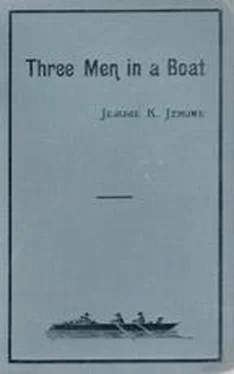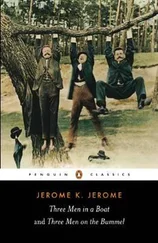«Oh, it's of no consequence,» the poor girls would murmur in reply, and covertly draw rugs and coats over themselves, and try and protect themselves with their lace parasols.
At lunch they had a very bad time of it. People wanted them to sit on the grass, and the grass was dusty; and the tree–trunks, against which they were invited to lean, did not appear to have been brushed for weeks; so they spread their handkerchiefs on the ground and sat on those, bolt upright. Somebody, in walking about with a plate of beef–steak pie, tripped up over a root, and sent the pie flying. None of it went over them, fortunately, but the accident suggested a fresh danger to them, and agitated them; and, whenever anybody moved about, after that, with anything in his hand that could fall and make a mess, they watched that person with growing anxiety until he sat down again.
«Now then, you girls,» said our friend Bow to them, cheerily, after it was all over, «come along, you've got to wash up!»
They didn't understand him at first. When they grasped the idea, they said they feared they did not know how to wash up.
«Oh, I'll soon show you,» he cried; «it's rare fun! You lie down on your — I mean you lean over the bank, you know, and sloush the things about in the water.»
The elder sister said that she was afraid that they hadn't got on dresses suited to the work.
«Oh, they'll be all right,» said he light–heartedly; «tuck `em up.»
And he made them do it, too. He told them that that sort of thing was half the fun of a picnic. They said it was very interesting.
Now I come to think it over, was that young man as dense–headed as we thought? or was he — no, impossible! there was such a simple, child–like expression about him!
Harris wanted to get out at Hampton Church, to go and see Mrs. Thomas's tomb.
«Who is Mrs. Thomas?» I asked.
«How should I know?» replied Harris. «She's a lady that's got a funny tomb, and I want to see it.»
I objected. I don't know whether it is that I am built wrong, but I never did seem to hanker after tombstones myself. I know that the proper thing to do, when you get to a village or town, is to rush off to the churchyard, and enjoy the graves; but it is a recreation that I always deny myself. I take no interest in creeping round dim and chilly churches behind wheezy old men, and reading epitaphs. Not even the sight of a bit of cracked brass let into a stone affords me what I call real happiness.
I shock respectable sextons by the imperturbability I am able to assume before exciting inscriptions, and by my lack of enthusiasm for the local family history, while my ill–concealed anxiety to get outside wounds their feelings.
One golden morning of a sunny day, I leant against the low stone wall that guarded a little village church, and I smoked, and drank in deep, calm gladness from the sweet, restful scene — the grey old church with its clustering ivy and its quaint carved wooden porch, the white lane winding down the hill between tall rows of elms, the thatched–roof cottages peeping above their trim–kept hedges, the silver river in the hollow, the wooded hills beyond!
It was a lovely landscape. It was idyllic, poetical, and it inspired me. I felt good and noble. I felt I didn't want to be sinful and wicked any more. I would come and live here, and never do any more wrong, and lead a blameless, beautiful life, and have silver hair when I got old, and all that sort of thing.
In that moment I forgave all my friends and relations for their wickedness and cussedness, and I blessed them. They did not know that I blessed them. They went their abandoned way all unconscious of what I, far away in that peaceful village, was doing for them; but I did it, and I wished that I could let them know that I had done it, because I wanted to make them happy. I was going on thinking away all these grand, tender thoughts, when my reverie was broken in upon by a shrill piping voice crying out: «All right, sur, I'm a–coming, I'm a–coming. It's all right, sur; don't you be in a hurry.»
I looked up, and saw an old bald–headed man hobbling across the churchyard towards me, carrying a huge bunch of keys in his hand that shook and jingled at every step.
I motioned him away with silent dignity, but he still advanced, screeching out the while: «I'm a–coming, sur, I'm a–coming. I'm a little lame. I ain't as spry as I used to be. This way, sur.»
«Go away, you miserable old man,» I said.
«I've come as soon as I could, sur,» he replied. «My missis never see you till just this minute. You follow me, sur.»
«Go away,» I repeated; «leave me before I get over the wall, and slay you.»
He seemed surprised.
«Don't you want to see the tombs?» he said.
«No,» I answered, «I don't. I want to stop here, leaning up against this gritty old wall. Go away, and don't disturb me. I am chock full of beautiful and noble thoughts, and I want to stop like it, because it feels nice and good. Don't you come fooling about, making me mad, chivying away all my better feelings with this silly tombstone nonsense of yours. Go away, and get somebody to bury you cheap, and I'll pay half the expense.»
He was bewildered for a moment. He rubbed his eyes, and looked hard at me. I seemed human enough on the outside: he couldn't make it out.
He said: «Yuise a stranger in these parts? You don't live here?»
«No,» I said, «I don't. YOU wouldn't if I did.»
«Well then,» he said, «you want to see the tombs — graves — folks been buried, you know — coffins!»
«You are an untruther,» I replied, getting roused; «I do not want to see tombs — not your tombs. Why should I? We have graves of our own, our family has. Why my uncle Podger has a tomb in Kensal Green Cemetery, that is the pride of all that country–side; and my grandfather's vault at Bow is capable of accommodating eight visitors, while my great–aunt Susan has a brick grave in Finchley Churchyard, with a headstone with a coffee–pot sort of thing in bas–relief upon it, and a six–inch best white stone coping all the way round, that cost pounds. When I want graves, it is to those places that I go and revel. I do not want other folk's. When you yourself are buried, I will come and see yours. That is all I can do for you.»
He burst into tears. He said that one of the tombs had a bit of stone upon the top of it that had been said by some to be probably part of the remains of the figure of a man, and that another had some words, carved upon it, that nobody had ever been able to decipher.
I still remained obdurate, and, in broken–hearted tones, he said: «Well, won't you come and see the memorial window?»
I would not even see that, so he fired his last shot. He drew near, and whispered hoarsely: «I've got a couple of skulls down in the crypt,» he said; «come and see those. Oh, do come and see the skulls! You are a young man out for a holiday, and you want to enjoy yourself. Come and see the skulls!»
Then I turned and fled, and as I sped I heard him calling to me: «Oh, come and see the skulls; come back and see the skulls!»
Harris, however, revels in tombs, and graves, and epitaphs, and monumental inscriptions, and the thought of not seeing Mrs. Thomas's grave made him crazy. He said he had looked forward to seeing Mrs. Thomas's grave from the first moment that the trip was proposed — said he wouldn't have joined if it hadn't been for the idea of seeing Mrs. Thomas's tomb.
I reminded him of George, and how we had to get the boat up to Shepperton by five o'clock to meet him, and then he went for George. Why was George to fool about all day, and leave us to lug this lumbering old top–heavy barge up and down the river by ourselves to meet him? Why couldn't George come and do some work? Why couldn't he have got the day off, and come down with us? Bank be blowed! What good was he at the bank?
Читать дальше












